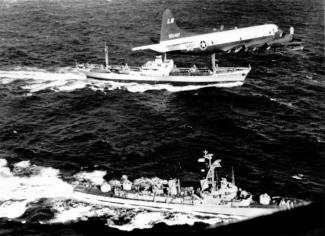Global affairs
Humankind cannot afford a new Cold War on our heating planet
 picture-alliance/AP
picture-alliance/AP
Last week, I attended a virtual conference that discussed the history of official development assistance (ODA). Several participants raised the question what difference the growing antagonism between Washington and Beijing will make. Someone even hinted that developing countries might benefit from the two superpowers’ more generous support. At first glance, that idea may seem plausible, but it is actually misleading, and I want to spell out why.
Because of the climate crisis, any new Cold War will be very different from the previous one between the USA and the Soviet Union. After the Second World War, humanity could afford to test which system – capitalism or communism – would prove more effective. The big danger was that the competition would escalate into a mutually annihilating nuclear war. There was thus a serious risk of global disaster, and things could indeed have gone badly wrong. However, it was enough to avoid direct armed struggle between the two superpowers and their closest allies to avoid the apocalypse.
This time is different. The global environmental crisis is escalating fast. The planet we share is heating up. Biodiversity is dwindling fast. Disasters are occurring more frequently. These are global phenomena that cannot be controlled or even limited by national governments acting on their own. We desperately need global cooperation to get a grip on these problems – and failure to do so will lead to particular hardship in low income countries which are particularly exposed to ecological dangers, but have contributed rather little to bringing those dangers about.
Humanity cannot afford an arms race therefore. Building military capacities is energy and capital intensive. We need to make better use of our resources.
Third World did not benefit from first Cold War
We should not forget, moreover, that the previous Cold War was not good for what was then called the Third World, the many developing countries in Asia, Africa and Latin America. Yes, to some extent governments did benefit from support they got from either the West or the East, but their nations largely remained stuck in poverty. Despots thrived whilst brutally suppressing their people. One-party and military rule were considered normal.
At the time, western governments promised to defend liberty, while the Warsaw Pact suggested it was promoting liberation. Either way, governance in Third World countries tended to be authoritarian. There were only very few developmental regimes, mostly in East Asia, that used despotic power to actually build the physical and social infrastructures that allow a nation to prosper.
Under Deng Xiaoping, China actually became the most striking example, after suffering dramatic famines and totalitarian repression under Mao Zedong. In the past decade, moreover, the regime has been becoming increasingly totalitarian once more under Xi Jinping (see Nora Sausmikat in Focus section of D+C/E+Z e-Paper 2017/02). Beijing’s international-development initiatives are often controversial. For example, China only pledged this year to finally stop supporting the construction of coal-based infrastructure in low and middle income countries. For far too long, it had kept doing so in spite of the climate crisis (see Nora Sausmikat and Quirin Jeske in Focus section of D+C/E+Z e-Paper 2020/05).
What is certain, however, is that autocratic leaders normally only plunder the countries they control. In the Cold War, it did not really make a difference whether they got support from Moscow or Washington. Why should we believe things would be different in another Cold War? Especially at a time when the global environmental crisis is destabilising societies anyway? Whether we like it or not, global cooperation is what we need. Unless we want to accept global disaster, there is no alternative.
Hans Dembowski ist the editor in chief of D+C/E+C.
euz.editor@dandc.eu
